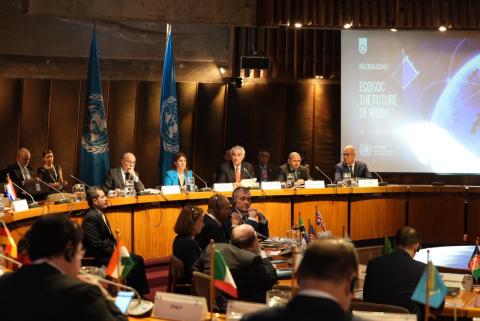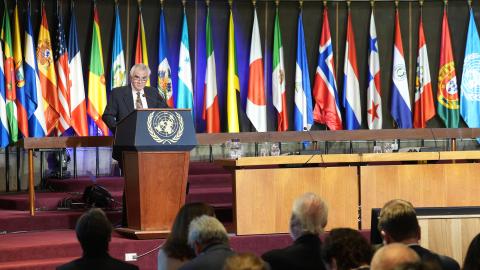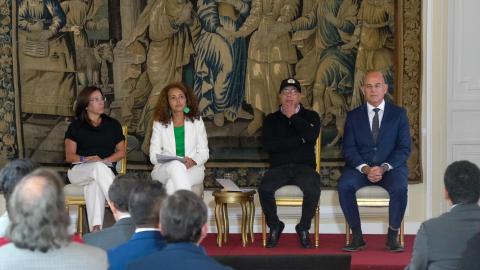News
“Public universities are tangible proof that free and quality education can go hand in hand, that public is not at the expense of excellence, that democracy can and should be the basis of harmonious coexistence in the pursuit of knowledge,” said Alicia Bárcena, ECLAC’s Executive Secretary, in her keynote speech for the start of the academic year at the University of Chile, the first state university in the country, founded in 1842.
During the event held at the institution’s main building in Santiago, remarks were also made by Chile’s Minister of Public Works, Alberto Undurraga, on behalf of President Michelle Bachelet; the Minister of Education, Adriana Delpiano; and University President Ennio Vivaldi. Other participants were the Provost, Rafael Epstein, Vice President of Academic Affairs, Rosa Devés, and Vice President of Financial and Institutional Management Affairs, Enrique Manzur.
Latin America and the Caribbean must wager on a new model of development that is sustainable in economic, social and environmental terms. This requires a “new academic agenda,” aligned with the goals of the 2030 Agenda for Sustainable Development, the most senior representative of the Economic Commission for Latin America and the Caribbean (ECLAC) highlighted. She also underscored the State’s role in innovation, and called for the strengthening of ties between universities and the productive sector and the creation of regional research networks.
During her speech, entitled “The Economic and Social Panorama for Latin America and the Caribbean in the New Global Context,” Bárcena addressed four key dimensions that can guide the efforts of countries in the region toward sustainable development: equality, innovation, integration and investment.
After two years of economic contraction, she said, positive (albeit low) GDP growth rates are projected for Latin America and the Caribbean in 2017, but the fall in public and private investment continue to be of concern, along with stagnant productivity. “There is also a risk of social deterioration due to low growth, greater unemployment and decreased public expenditure,” she added.
In light of the current great uncertainty, regional integration is more necessary than ever, indicated Bárcena, and therefore the region should “foster the merging of existing regional integration mechanisms, advance toward a single digital market, implement a regional infrastructure program, develop regional production chains and accelerate the agenda for trade facilitation,” she said.
This requires, she sustained, government support for industrial research and development (R&D) projects; the use of market mechanisms in public research institutions (patenting, licensing and technology transfer agreements); the establishment of technology parks, hubs and clusters; and the forging of networks and alliances for scientific and technological information exchange, among other measures.
Currently, R&D investment in the region is miniscule, with some 520 researchers per million inhabitants on average (far below that of developed countries), likewise its participation in global patent applications (barely 2%).
Bárcena spoke before an audience of government and parliamentary authorities, Armed Forces representatives, members of the diplomatic corps, scholars and students, as well as participating chancellors in the VIII General Assembly of Chancellors of the Network of Public Macro-Universities from Latin America and the Caribbean (created in 2002 and made up of 37 public universities in 20 countries), which will be held in the same location this Thursday and Friday.
“There should be a collaborative relationship among the universities of Latin America and the Caribbean to generate knowledge and practice and involve the next generations of professionals and leaders” in the processes of sustainable development within these countries, she concluded.



